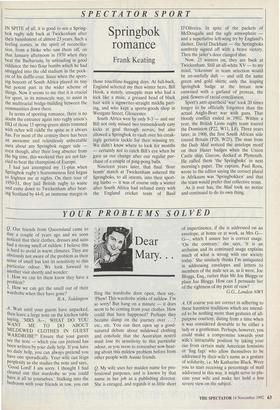YOUR PROBLEMS SOLVED
Dear Mary. . .
Q. Our friends from Queensland came to stay a couple of years ago and we soon noticed that their clothes, dresses and suits had a strong smell of mildew. I believe this is hard to avoid in warm climates. They are obviously not aware of the problem as their sense of smell has lost its sensitivity to this particular odour. We look forward to another visit shortly and wonder:
1. How we can let them know they have a problem?
2. How we can get the smell out of their wardrobe when they have gone? R.A., Teddington
11. Wait until your guests have unpacked, then leave a large note on the kitchen table saying, 'MRS A—, WHAT DO YOU WANT ME TO DO ABOUT MILDEWED CLOTHES IN GUEST WARDROBE?' Ensure that your guests see the note — which you can pretend has been written by your daily help. If you have no daily help, you can always pretend you have one sporadically. Your wife can feign perplexity as she studies the note and says,. `Good Lord! I am sorry. I thought I had cleared out that wardrobe so you could have it all to yourselves.' Stalking into the bedroom with your friends in tow, you can
fling the wardrobe door open, then say,. `Phew! This wardrobe stinks of mildew. I'm so sorry! But hang on a minute — it does seem to be coming from your clothes. How could that have happened? Perhaps they became damp on the journey over . .? etc., etc. You can then open up a good- natured debate about mildewed clothing and conclude that the Australian nostril must lose its sensitivity to this particular odour, as you seem to remember now hear- ing about this mildew problem before from other people with Aussie friends.
Q. My wife uses her maiden name for pro- fessional purposes, and is known by that name in her job as a publishing director. She is enraged, and regards it as little short
of impertinence, if she is addressed on an envelope, at home or at work, as Mrs G— G—, which I assure her is correct usage. `On the contrary,' she says, 'it is an archaism and its continued usage explains much of what is wrong with our society today.' She similarly thinks I'm antiquated in addressing envelopes and letters to members of the male sex as, as it were, Joe Bloggs, Esq., rather than Mr Joe Bloggs or plain Joe Bloggs. How can I persuade her of the rightness of my point of view?
G.G., London NW5 A. Of course you are correct in adhering to these harmless traditions which are intend- ed to be nothing more than gestures of all- purpose courtesy, dating from a time when it was considered desirable to be either a lady or a gentleman. Perhaps, however, you could make a compromise towards your wife's intractable position by taking your cue from certain male American feminists or 'hag fags' who allow themselves to be addressed by their wife's name as a gesture of solidarity, i.e. Mr Katharine Black. Were you to start receiving a percentage of mail addressed in this way, it might serve to pla- cate your wife and make her hold a less severe view on the subject.


































































 Previous page
Previous page